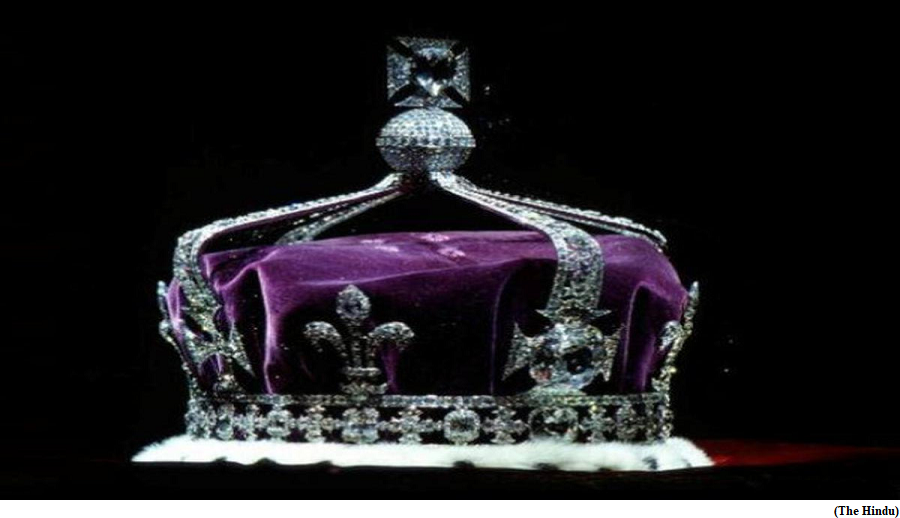Bring back Kohinoor from the U.K., parliamentary panel notes in its report (GS Paper 1, Culture)

Why in news?
- The report on “Heritage theft — the illegal trade in Indian antiquities and the challenges of retrieving and safeguarding our tangible cultural heritage” was adopted recently by the Standing Committee on Transport, Tourism and Culture headed by YSR Congress Party MP Vijay Sai Reddy.
Details:
- It said, nothing prevents India from seeking the return of the Kohinoor, a diamond which left Indian shores in the early 1850s and is currently embedded in the crown of the British monarch.
- The Ministry of Culture said that while efforts were being made to bring in stolen artefacts, the case of Kohinoor is contentious since it was surrendered by Maharaja Dalip Singh as part of the 1849 peace treaty with the British.
- India does not have legal competence to demand the return of the diamond.
- Under the provisions of the Antiquities and Art Treasure Act, 1972, the Archaeological Survey of India takes up the issue of retrieval of only such antiquities that have been illegally exported out of the country.
UNSECO Convention:
- The Culture Ministry’s stand is consistent with its 2016 affidavit filed in the Supreme Court, where it had said that the diamond cannot be reclaimed as it was given as a gift.
- To cap the deliberations, the panel also met Law Secretary Niten Chandra to understand if the case could be legally pursued.
- He had informed the panel that “a combined reading of Articles 7 and 15 of the 1970 UNESCO convention indicates that the convention does not prevent state parties from entering special agreements for the restitution of removed cultural properties”.
Way Forward:
- Based on the deliberations, the panel has urged the Ministry of Culture to “follow global practice and make all efforts to ensure precious historical artefacts are returned”.
Rohingya refugees in India under arbitrary detention, denied exit permissions
(GS Paper 3, Internal Security)
Why in news?
- India is not allowing exit permissions for Rohingya refugees who have completed refugee status determinations with the UN Refugee Agency (UNHCR) and “gained approval from third countries for resettlement”, says a new report titled “A shadow of refuge: Rohingya refugees in India”.
- The report, jointly prepared by The Azadi Project, a women’s rights non-profit, and Refugees International, an international NGO that advocates for the rights of stateless people, was released recently.

Claims made in the report:
- The report notes that “instead of refusing exit visas, India can help facilitate more resettlement opportunities” by advocating for resettlement in ally countries and other European nations at forums such as the G-20 summit.
- On the one hand, they are disallowed from leaving when they get a chance to resettle in another country; on the other, the Rohingya in India are vilified as “illegal migrants”, face growing “anti-Muslim and anti-refugee xenophobia”, and live under constant fear of being deported back to Myanmar.
- Among the biggest challenges faced by Rohingya refugees in India, who number at least 20,000, is arbitrary detention. Once picked up, they are held in “holding centres” where conditions are “deplorable”.
Violation of Human rights:
- Actual and threatened deportations have also fostered a sense of fear within the Rohingya community, prompting some to return to camps in Bangladesh.
- Though the International Covenant on Civil and Political Rights, the Convention on the Rights of the Child, as well as the International Genocide Convention obligate India not to return the Rohingya to Myanmar, “the Supreme Court accepted the government’s arguments that the Rohingya were a threat to national security and refuses to stop deportation”.
- The report details the harsh living conditions of the Rohingya in slum-like settlements with no safe running water or toilets, and no access to basic healthcare, education for children, or employment opportunities.
- While earlier the UNHCR cards had provided access to some level of education and livelihoods, and to protection from detention and deportation, now the government has taken a stand that “UNHCR refugee status without valid travel documents is of no consequence in India”.
Way Forward:
- It urges India to formally recognise the Rohingya in India as “refugees with a right to asylum rather than as illegal migrants”.
- Short of this, the least that India could do is “a simple acknowledgement of residency” by recognising UNHCR cards as “sufficient for accessing basic education, work, and health services or provision of Aadhaar cards to refugees as proof of residency”.



